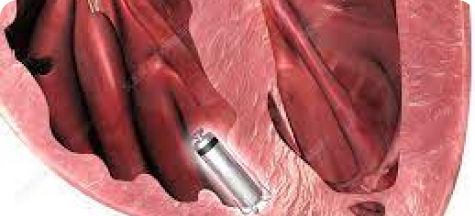Cardiac technology has seen a groundbreaking evolution with the introduction of leadless pacemakers. These advanced devices, now available in Noida NCR and Delhi, offer a safer and more efficient alternative to traditional pacemakers. Unlike conventional models, which rely on leads (wires) to connect the device to the heart, leadless pacemakers are completely self-contained and implanted directly into the heart, eliminating many complications associated with traditional pacemakers.
For residents of Noida NCR and Delhi experiencing heart rhythm disorders, leadless pacemakers present a modern solution to improve quality of life while ensuring optimal cardiac care.
What Are Leadless Pacemakers?
Leadless pacemakers are miniature, wireless devices designed to regulate heart rhythms without the need for leads. Their compact size and innovative technology allow them to be implanted directly into the heart via a minimally invasive procedure. This design eliminates common issues such as lead dislodgment, lead fractures, or infections at the lead insertion site.
Benefits of Leadless Pacemakers for Patients in Noida NCR and Delhi
- Minimally Invasive Procedure
Implanting a leadless pacemaker requires no surgical incision in the chest, unlike traditional pacemakers. A catheter-based approach through the femoral vein in the leg ensures a quicker recovery and reduced post-procedure discomfort.
- Reduced Risk of Infection
With no leads or surgical pockets, leadless pacemakers significantly lower the risk of infections, making them a safer option for patients.
- Enhanced Comfort and Mobility
These devices eliminate the bulky feeling and restrictions often associated with traditional pacemakers, allowing patients to lead active lifestyles.
- Lower Long-Term Complications
Leadless pacemakers are less prone to complications such as lead fractures or dislodgement, ensuring a longer-lasting and more reliable solution.
- Aesthetic Advantages
The absence of visible scars or device bulges makes leadless pacemakers a preferred choice for patients concerned about physical appearance.
How Leadless Pacemakers Work
A leadless pacemaker is inserted directly into the right ventricle of the heart, where it monitors and regulates heartbeats using built-in sensors and electrodes. Unlike traditional pacemakers, this device doesn’t require a pulse generator or leads to deliver electrical signals. It communicates wirelessly with external programming devices used by cardiologists for monitoring and adjustments.
Leadless Pacemaker Technology: A Leap Forward
For patients in Noida NCR and Delhi, advancements in leadless pacemaker technology mean access to cutting-edge cardiac care. These devices are engineered to operate seamlessly for extended periods, offering durability and precision in managing heart rhythm disorders. Manufacturers are continually innovating to enhance battery life, improve device performance, and expand compatibility for diverse cardiac conditions.
Who Can Benefit From Leadless Pacemakers?
Patients in Noida NCR and Delhi with conditions such as bradycardia (slow heart rate) or atrial fibrillation may benefit from leadless pacemakers. They are particularly suitable for individuals who:
- Are prone to infections.
- Have experienced complications with traditional pacemakers.
- Require single-chamber pacing.
- Prefer a minimally invasive procedure.
Procedure for Implanting a Leadless Pacemaker
- Pre-Procedural Assessment
Cardiologists in Noida NCR and Delhi perform a thorough evaluation, including ECGs and imaging tests, to ensure the suitability of a leadless pacemaker.
- Implantation
The pacemaker is inserted via a catheter through the femoral vein. This minimally invasive technique minimizes scarring and ensures quicker recovery times.
- Post-Implantation Monitoring
After implantation, patients are monitored to ensure the device functions correctly and that there are no complications. Follow-up visits are essential for ongoing device management.
Why Choose Leadless Pacemakers in Noida NCR and Delhi?
- Access to Top Cardiac Specialists
Leading hospitals and clinics in Noida NCR and Delhi boast world-class cardiologists experienced in implanting leadless pacemakers.
- Advanced Medical Infrastructure
The region is home to state-of-the-art facilities equipped with the latest technology for cardiac care.
- Cost-Effective Treatment Options
With various hospitals and clinics offering competitive pricing, patients can access high-quality treatment without financial strain.
- Personalized Care
Patients in Noida NCR and Delhi benefit from tailored treatment plans to meet their unique medical needs.
What to Expect Post-Procedure
Patients in Noida NCR and Delhi can expect a swift recovery after leadless pacemaker implantation. Common post-procedure guidelines include:
- Avoiding strenuous activities for a few weeks.
- Attending regular follow-up appointments for device monitoring.
- Watching for signs of complications, such as swelling or discomfort at the implantation site.
The Future of Leadless Pacemakers
Leadless pacemakers represent the future of cardiac care. Ongoing advancements aim to improve multi-chamber pacing capabilities, device longevity, and integration with digital health platforms. For patients in Noida NCR and Delhi, staying informed about these developments ensures access to the best possible care.
FAQs About Leadless Pacemakers
- What is the cost of a leadless pacemaker in Noida NCR and Delhi?
The cost varies depending on the hospital and the specific device used. Patients can expect a range of INR 2,00,000 to INR 5,00,000.
- Are leadless pacemakers safe?
Yes, they are safe and have been approved by global regulatory bodies. They are less prone to complications compared to traditional pacemakers.
- How long does a leadless pacemaker last?
Most devices have a lifespan of 8-12 years, depending on usage and individual health conditions.
- Can anyone get a leadless pacemaker?
Not all patients are suitable candidates. Consult with a cardiologist in Noida NCR or Delhi to determine eligibility.
- Is the implantation procedure painful?
The procedure is minimally invasive and typically performed under local anesthesia, ensuring minimal discomfort.
